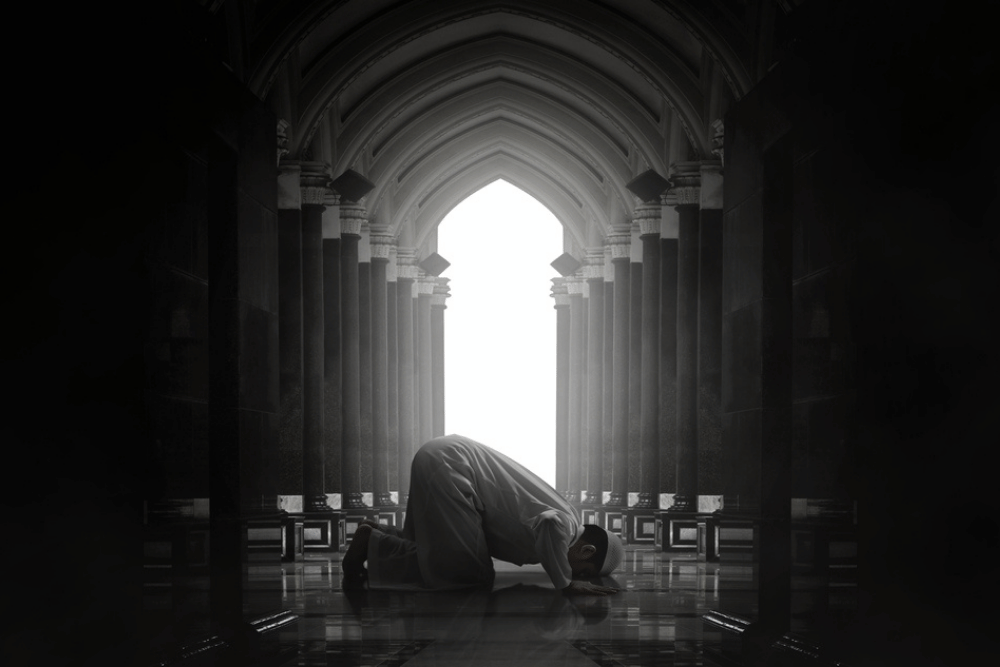Introduction:
When stress takes over, it can feel like peace is out of reach. But Islam gives us meaningful ways to handle those overwhelming moments. One of the most powerful approaches is turning to Salaah (prayer) and practicing patience (Sabr). These aren’t just rituals—they’re lifelines that help us reconnect with Allah and draw strength to face life’s challenges.
Islam beautifully reminds us that true well-being comes from gratitude (Shukr) and patience (Sabr). Instead of running from difficulties, we’re taught to face them head-on, knowing that each trial is an opportunity to grow spiritually and come closer to Allah. It’s not always easy, but this perspective can bring a deep sense of peace and resilience.
In this article, we’ll explore how these practices and values help manage stress and cultivate inner peace
1. Perform Salaah (Prayer) and Be Patient
One way to find peace in life is through Salaah (prayer) and patience. Allaah Almighty reminds us in the Qur’an:
اسْتَعِيْنُوْا بِالصَّبْرِ وَالصَّلٰوةِ ۭاِنَّ اللّٰهَ مَعَ الصّٰبِرِيْنَ
“O you who have believed, seek help through patience and prayer. Indeed, Allaah is with the patient”
(Qur’an 1:153)
Many people struggle with anxiety and frustration, but those who remain patient and turn to Allaah for help find peace. When life feels heavy, prayer can offer comfort. A person who raises their hands in Salaah, saying “Allaahu Akbar,” acknowledges that they are seeking Allaah’s help, The Greatest. Through the act of praying, sorrows and pains are eased. The tears shed during Salaah are not a sign of weakness, but rather a release of burdens, making the heart lighter.
In moments of struggle, Salaah teaches us an important lesson: we are servants of Allaah, not the creators of our own destiny. The world is full of tests, and not all our desires will be fulfilled here. However, through Salaah, we remember that patience is our duty. Salaah helps us connect with Allaah and brings us peace by reminding us of His greatness. The Prophet Muhammad ﷺ said,
وَالصَّلاَةُ نُورٌ وَالصَّدَقَةُ بُرْهَانٌ وَالصَّبْرُ ضِيَاءٌ وَالْقُرْآنُ حُجَّةٌ لَكَ أَوْ عَلَيْكَ
“Prayer is a light, and charity is proof (of one’s faith) and endurance is a brightness and the Holy Qur’an is a proof on your behalf or against you.”
(Saheeh al Muslim, Kitaab at Tahaarah, Hadith 223)
and this light comes to us when we remain patient, even when it feels difficult.
When we are frustrated or angry, it can be hard to think clearly. Our emotions cloud our judgement, and later we may regret our actions. However, patience gives us clarity. The emotional person reacts impulsively, but the patient person takes a moment to pause, breathe, and think before responding. By controlling our emotions, we find the strength to make better decisions.
For example, imagine a person who is scolded by their boss. In anger, they may feel the urge to retaliate. But someone who is patient may hold back, knowing that reacting in the heat of the moment will only make things worse. Later, the boss may apologize, realizing their mistake, and even offer the person a promotion (anything is possible by Allaah’s Will).
In this way, patience helps avoid unnecessary pain and opens the door to future opportunities.
By practicing Salaah and patience, we can find peace in times of hardship and clarity in times of confusion. Both teach us to trust in Allaah’s plan and to remain calm in the face of life’s challenges.
2. True Well-being Lies in Gratitude (Shukr) and Patience (Sabr)
We often complicate things, whether in our work or personal lives. We fill our days with so many tasks and concerns that it becomes difficult to know where to start or what to focus on.
This confusion can lead to distress, making it hard to solve the problems we face. So, what can we learn from Islam about handling life’s challenges?
One important lesson is that trials and difficulties are inevitable. They will come, whether we expect them or not. For example, someone may feel healthy and happy, but a routine doctor’s visit might reveal a serious illness. Life can change in an instant, and we cannot control when challenges arise. The key is to accept that hardship is part of life. Islam teaches that this world is a place of tests and trials, and the ultimate reward is in the Hereafter. By mentally preparing ourselves for these tests, we can navigate them with strength and resilience.
As the Glorious Qur’an reminds us,
كُلُّ نَفْسٍ ذَاۗىِٕقَةُ الْمَوْتِ ۭ وَنَبْلُوْكُمْ بِالشَّرِّ وَالْخَيْرِ فِتْنَةً ۭ وَاِلَيْنَا تُرْجَعُوْنَ
“Every soul will taste death. And We test you with evil and with good as trial; and to Us you will be returned”
(Qur’an 21:35)
There are two types of tests: times when life feels easy and times when we encounter hardship. Both are tests, not rewards. When things are going well, we should remember that this, too, is a test of gratitude. The Prophet Muhammad ﷺ said that the state of a believer is truly remarkable. When ease comes, the believer shows gratitude to Allaah, saying, “O Allaah, You have been so kind to me.” This gratitude brings blessings and peace into our lives.
On the other hand, when life brings difficulty, patience (Sabr) is essential. Patience doesn’t mean suppressing our emotions, but rather handling them in a healthy way. Suppressing feelings can lead to unexpected outbursts. Instead, we must allow ourselves to feel, but find constructive ways to express and manage those emotions.
Ultimately, our identity shapes how we handle challenges. Each day is an opportunity to reflect on who we are. By recognizing our true selves, we can manage both happiness and sadness more effectively. Islam teaches us that in both times of ease and hardship, we can turn to Allaah-expressing gratitude in good times and patience in difficult ones.
Escaping Trials is Not Possible
Life is full of tests-both big and small. No matter who you are, where you’re from, or what you do, you will face challenges. Whether you’re a business owner, an employee, or someone simply trying to get by, everyone experiences trials at some point. Allaah tells us in the Quran,
On the other hand, when life brings difficulty, patience (Sabr) is essential. Patience doesn’t mean suppressing our emotions, but rather handling them in a healthy way. Suppressing feelings can lead to unexpected outbursts. Instead, we must allow ourselves to feel, but find constructive ways to express and manage those emotions.
Ultimately, our identity shapes how we handle challenges. Each day is an opportunity to reflect on who we are. By recognizing our true selves, we can manage both happiness and sadness more effectively. Islam teaches us that in both times of ease and hardship, we can turn to Allaah-expressing gratitude in good times and patience in difficult ones.
كُلُّ نَفْسٍ ذَاۗىِٕقَةُ الْمَوْتِ ۭ وَنَبْلُوْكُمْ بِالشَّرِّ وَالْخَيْرِ فِتْنَةً ۭ وَاِلَيْنَا تُرْجَعُوْنَ
“Every soul will taste death. And We test you with evil and with good as trial; and to Us you will be returned”
(Qur’an 21:35)
We all know that one day, our lives will come to an end. What is uncertain is when, how, or where. Some may live to old age, while others may not. Death is a reality we cannot escape, but what we can control is how we live. The important question is not when we will die, but how we will live before that inevitable moment arrives.
Allaah also teaches us in the Quran that life itself is a test:
وَلَنَبْلُوَنَّكُمْ بِشَيْءٍ مِّنَ الْخَوْفِ وَالْجُوْعِ وَنَقْصٍ مِّنَ الْاَمْوَالِ وَالْاَنْفُسِ وَالثَّمَرٰتِ ۭ وَبَشِّرِ الصّٰبِرِيْنَ
“And We will surely test you with something of fear and hunger and a loss of wealth and lives and fruits, but give good tidings to the patient”
(Qur’an 2:155)
We will face challenges-whether in our health, relationships, finances, or work. But we will also experience blessings, such as love, success, and happiness. These ups and downs are an inherent part of life. At times, we may feel that everything is going well-good health, a happy family, financial security. But even in these moments, unexpected challenges may arise. A sudden illness, an unexpected loss, or a financial setback can shake us. Even wealth can be a source of stress, as we worry about losing it or how to protect it.
It’s natural to wish for a life free from problems, but the truth is that life will always present its share of challenges. No one can escape hardship forever. The cycle of joy and sorrow, success and failure, is a natural part of life. The key is learning how to handle it.
Many people struggle to cope with difficulties. Some feel overwhelmed by stress, anxiety, or sadness. When people don’t know how to manage these feelings, they may turn to unhealthy coping mechanisms like substance abuse, excessive sleep, or even self-harm.
Sadly, in extreme cases, some people lose hope and make tragic decisions. This is why it’s so important to develop resilience in the face of hardship. Life won’t always be easy, but with patience, faith, and wise action, we can manage stress and face challenges with grace.
Islam offers guidance on how to cope with life’s difficulties. The solution lies in managing, not eliminating, stress. Islam teaches us that life is a test, and we should approach both its joys and sorrows with patience. When hardship comes, remember that your response is what matters most. You can’t always control what happens to you, but you can control how you react. By practicing patience, gratitude, and faith in Allaah, you can find peace-even in the most difficult times.
In the end, life is not about avoiding trials—it’s about learning how to navigate them with a heart full of trust in Allaah. Remember, no trial lasts forever, and no moment of joy is permanent. Both good and bad times are part of the journey. What truly matters is how you live your life and how you face each moment with patience and resilience.
Conclusion:
When we bring Salaah, patience, and gratitude into our daily lives, we create space for peace even during stressful times. These simple yet powerful practices deepen our connection with Allah and remind us that we’re never alone in our struggles.
Life will always have its ups and downs, but when we see challenges as part of our journey and trust in Allah’s wisdom, we can face them with resilience and hope. His mercy and guidance are always there for us—offering comfort, strength, and the reassurance that we’re in His care.




